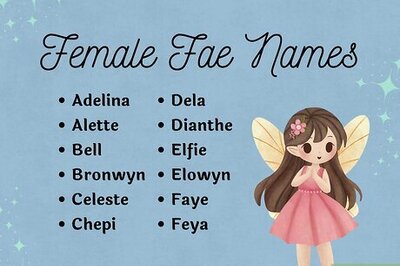
views
What does “You As Well” mean?

“You as well” is a more formal way of saying “you, too.” It’s a shortened form of the phrase “you X as well,” where the X stands for a compliment or good wishes you want to reciprocate. For example, if someone says, “Have a nice day!” the full response would be, “You have a nice day as well!” but you’re more likely to shorten it to, “You as well!” “You as well” is more common in British English than American English because Americans are more likely to use the phrase “you, too.” This phrase is most often used in casual conversation and not in formal writing.
How to Use “You As Well”

Use “you as well” to respond when someone wishes you well. The most common way to use this phrase is to respond to, “Have a good day!” or a similar expression of good wishes. It can also be used to respond to holiday greetings like “Happy Halloween!” or “Merry Christmas!” Since “as well” can be used interchangeably with “too” in many cases, most of the time, you can use “you as well” any time you would use “you, too.” Person 1: “Have a nice lunch, Will!” Person 2: “You as well, Steve!” Make sure that reciprocating the same sentiment is logical. For example, if a waitress in a restaurant tells you to have a nice lunch, it would only be appropriate to reply “you as well” if they were also going to have lunch.
“You as well” can also be used sarcastically to reciprocate an insult. Saying “you as well” when someone insults you can be a humorous way to lighten the mood. It can be delivered in a playful, teasing manner with friends or with a little more bite if someone is seriously insulting. Person 1: “You’re such a jerk, Manny.” Person 2: “You as well, Dave.” Sarcasm relies on tone and expression to convey meaning. If you aren’t used to being sarcastic, brush up on your skills to make sure your message comes across loud and clear.
Say “you as well” when you want to include another person. Less commonly, you can say “you as well” to include another person in the conversation, usually as an afterthought. It can often take the form of extending an existing courtesy or invitation to another person. “You’re always welcome to visit, Bob. And you as well, Cindy!” “Thank you so much for your help moving, Mel. And you as well, Karl!”
“You as well” can be phrased as a question to get information. When you tell a story, and you want to know if another person has experienced the same thing, you can ask them, “You as well?” This usage can also sound overly formal in the US, where most people would say, “You, too?”
What to Say instead of “You As Well”

There are several phrases you can use in place of “you as well.” Since this phrase is more commonly used in the UK, it can feel a little too formal for people in the US. Luckily, there are many casual options and a few formal alternatives, such as: “You, too!” “And you!” “You also!” “Same to you!” “Likewise!” “Right back at you!” “Ditto!” “Same!” “The feeling is mutual!” “I wish you the same!” “I heartily reciprocate the same!” “Same goes for you!” “Wishing you the same!” “As well to you!” “Also to you!”
How to Respond to “You As Well”
The best way to respond to “you as well” is with some form of thanks. In most cases, if someone says, “you as well,” they mean to send you good wishes or return a compliment. A simple thank you is always the appropriate response. Even if someone uses the phrase sarcastically, you can come right back with a sarcastic “Thanks.” You can also use any form of thank you, such as: “I appreciate it!” “Much obliged!” “Cheers!” “That’s so kind of you!” “Much appreciated!” “Many thanks!”
Is "I As Well" grammatically correct?

It's not grammatically correct to say “I as well.” There's confusion around this phrase, with some thinking it's a more formal way to say “me too” when you want to tell someone you have shared a similar experience or agree with a statement. While it’s acceptable to say “me as well” in casual conversation, “me too” is more common and less awkward. When you want to agree with a statement or experience, other acceptable phrases to use instead of “I as well” are “I do too” and “so do I.”




















Comments
0 comment